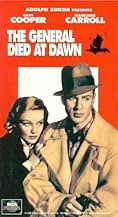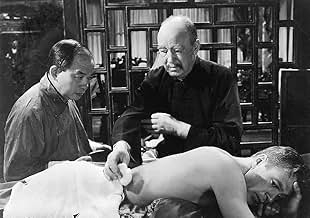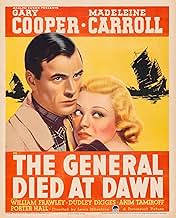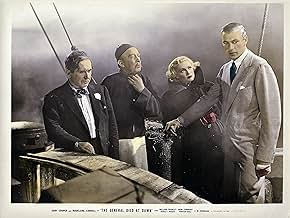IMDb RATING
6.4/10
1.4K
YOUR RATING
Amid the anarchy of China, an American mercenary tangles with a ruthless warlord.Amid the anarchy of China, an American mercenary tangles with a ruthless warlord.Amid the anarchy of China, an American mercenary tangles with a ruthless warlord.
- Director
- Writers
- Stars
- Nominated for 3 Oscars
- 1 win & 3 nominations total
Lee Tong Foo
- Mr. Chen
- (as Lee Tung-Foo)
Hans Fuerberg
- Yang's Military Advisor
- (as Hans Furberg)
Irene Bennett
- Passenger
- (uncredited)
Spencer Chan
- Killer
- (uncredited)
Thomas Chan
- Houseboy
- (uncredited)
- Director
- Writers
- All cast & crew
- Production, box office & more at IMDbPro
Featured reviews
The scene in the train where femme fatal Judy Perrie seduces O'Hara is a masterpiece of steamy sensuality. Carroll's silky-smooth alabaster skin and flaxen hair, gorgeously highlighted by her exquisitely outlined lips and eyes, were masterfully exploited by director Lewis Milestone and some extremely skilled cameramen, as her feminine delights proved too much for the otherwise unswervingly steadfast O'Hara. Throughout, the curiously uneven script takes a decided turn for the better, with both participants delivering some highly suggestive verbal exchanges, brimming with innuendo and wit, culminating with O'Hara mockingly asking Judie if he can kiss her, only to receive in return the playful reply that he must first ask her mother. He then looks into the neighboring compartment and makes the request in mock earnestness, for there is no Mrs. Perrie! All the while, the sinister war lord General Yang and his dark forces are preparing to intercept the train, "relieve" O'Hara of the funds he's set to deliver to Mr. Wu for the sole purpose of ridding the province of the scurrilous Yang. Let your imaginations soar, esteemed classic film buffs, for this is truly great film-making.
The General Died at Dawn, the title itself is enough of a giveaway as to what happens. But the circumstances leading up to the death of Chinese Warlord Akim Tamiroff is quite a tale.
The setting for this film is Kuomintang China where the government of Chiang Kai-Shek doesn't have its writ run very far. Most of China in the Twenties is controlled by various provincial warlords. In fact a case could be made that the Chinese Communists under Mao Tse-tung was viewed as just another warlord. But that's a whole different story.
American adventurer Gary Cooper has a money belt with a whole lot of cash in it entrusted to him by the opposition faction to Akim Tamiroff. He's supposed to make contact with William Frawley in Shanghai who when he's not drinking the hotel bar dry, runs guns.
But Madeleine Carroll and her father Porter Hall who are working for Tamiroff help Tamiroff part Cooper from his money. In the case of Coop, he's real guilty of thinking with his gonads. Then Porter Hall steals the money for himself and the film gets real interesting.
There's one big flaw in the film, occurring when Madeleine Carroll who starts falling for Cooper, refers to him as the "O'Hara Boy." O'Hara is Cooper's character name. Coop was 35 when this film was made and referring to him as 'boy' was ludicrous. But then again a man of 35 should have been on better guard. Film might have worked better if someone younger like Robert Taylor or Tyrone Power played the part of O'Hara. Or Clifford Odets's script should have given Carroll a more elaborate ruse to play on Cooper.
Two major oriental roles were given to occidental players. Casting like Akim Tamiroff as the warlord Yang and Dudley Digges as Mr. Wu who employs Cooper would never happen today. But both do well and come to think of it Tamiroff does have an oriental strain in his ancestry.
One bit of casting really hits home. By all accounts William Frawley was hardly the lovable tightwad Fred Mertz in real life. He was a misanthropic alcoholic in the tradition of W.C.Fields and a mean drunk when he was loaded which was often back then. His role as Brighton, the misanthropic, mean, and thoroughly racist gunrunner was way closer to the real Bill Frawley.
Gary Cooper in The General Died at Dawn was playing a role that Humphrey Bogart would probably have done in the forties. It was always joked that Cooper's dialog consisted of 'yup' and 'nope.' But the way he gets himself, Carroll and Digges out of a real predicament in the end called for quite a gift of gab.
The setting for this film is Kuomintang China where the government of Chiang Kai-Shek doesn't have its writ run very far. Most of China in the Twenties is controlled by various provincial warlords. In fact a case could be made that the Chinese Communists under Mao Tse-tung was viewed as just another warlord. But that's a whole different story.
American adventurer Gary Cooper has a money belt with a whole lot of cash in it entrusted to him by the opposition faction to Akim Tamiroff. He's supposed to make contact with William Frawley in Shanghai who when he's not drinking the hotel bar dry, runs guns.
But Madeleine Carroll and her father Porter Hall who are working for Tamiroff help Tamiroff part Cooper from his money. In the case of Coop, he's real guilty of thinking with his gonads. Then Porter Hall steals the money for himself and the film gets real interesting.
There's one big flaw in the film, occurring when Madeleine Carroll who starts falling for Cooper, refers to him as the "O'Hara Boy." O'Hara is Cooper's character name. Coop was 35 when this film was made and referring to him as 'boy' was ludicrous. But then again a man of 35 should have been on better guard. Film might have worked better if someone younger like Robert Taylor or Tyrone Power played the part of O'Hara. Or Clifford Odets's script should have given Carroll a more elaborate ruse to play on Cooper.
Two major oriental roles were given to occidental players. Casting like Akim Tamiroff as the warlord Yang and Dudley Digges as Mr. Wu who employs Cooper would never happen today. But both do well and come to think of it Tamiroff does have an oriental strain in his ancestry.
One bit of casting really hits home. By all accounts William Frawley was hardly the lovable tightwad Fred Mertz in real life. He was a misanthropic alcoholic in the tradition of W.C.Fields and a mean drunk when he was loaded which was often back then. His role as Brighton, the misanthropic, mean, and thoroughly racist gunrunner was way closer to the real Bill Frawley.
Gary Cooper in The General Died at Dawn was playing a role that Humphrey Bogart would probably have done in the forties. It was always joked that Cooper's dialog consisted of 'yup' and 'nope.' But the way he gets himself, Carroll and Digges out of a real predicament in the end called for quite a gift of gab.
I was surprised at the low rating for this film at IMDb, 6.7 as of this writing. I found it a very enjoyable film. I'm a sucker for strong, moody visuals, and this film sure has them. In fact, about half way through I began to wonder, with all the shadows and fishing nets, if this were a Von Sternberg film. The script, which some reviewers found too wordy or too preachy, I found very engaging. The pacing was excellent.
Some reviewers have taken offense at the two main Chinese characters being played by occidentals who spoke pigeon English. Well, that's how films were made back then. Sure it seems unfair to modern viewers. It was unfair. Is that reason to trash the whole film? The Asian actors who had speaking roles came across as intelligent and well spoken.
If you're in the mood for some dark, exotic espionage, I definitely recommend this.
Some reviewers have taken offense at the two main Chinese characters being played by occidentals who spoke pigeon English. Well, that's how films were made back then. Sure it seems unfair to modern viewers. It was unfair. Is that reason to trash the whole film? The Asian actors who had speaking roles came across as intelligent and well spoken.
If you're in the mood for some dark, exotic espionage, I definitely recommend this.
Lewis Milestone is surely one of the most under-appreciated directors from Hollywood's Golden Era. He may be the best example to illustrate how cinematographers and film editors have less to do with how good a movie looks than the director himself. Lewis Milestone's pictures exhibit the same fluid, sensuous, exhilarating black and white cinematography and silky smooth scene changes no matter who his camera man and editor were. The fluid movement of his camera was his trade mark and an innovative style much copied, especially in the 'forties. He is in fact credited with the invention of the camera dolly while filming the early talkie classic All Quiet On The Western Front (1930).
In The General Died At Dawn the gorgeous cinematography finds a worthy subject of concentration in the breath-taking beauty of leading lady Madeleine Carroll, who plays a tormented femme fa-tale, manipulated into wicked and even murderous money-making schemes by her terminally ill and morally challenged father (Porter Hall). When she has to lure idealistic soldier of fortune Gary Cooper into the clutches of cruel, tyrannical Chinese warlord Akim Tamiroff, she quite naturally falls in love with him -- Cooper, not Tamiroff, of course! Miss Carol has never looked lovelier than in this picture. As she reached thirty years of age, a dawning maturity was adding character to her beauty and endowing her gorgeous face with an aching sensuality. Okay, trying to describe what makes a beautiful woman that way is like trying to describe what makes Oreo cookies taste so good. Believe me, Madeleine had it! Not to mention, she was a terrific actress!
When Gary Cooper is on screen, he doesn't have to worry about anyone stealing attention, even a beaut like Madeline Carroll. Tamiroff, who earned an Accademy Award nomination for his role, is bizarrely riveting, as he was in nearly every movie appearance. Good support is also provided by Hall in one of his best performances, Dudley Digges, and William Frawley. Frawley is rather irritating, as in all his roles, but it was intended here.
The plot is confusing at times, and doesn't always make complete sense, but it wasn't so difficult to keep up with as others have carried on. Compared to, say, The Big Sleep (1946), it was as easy to follow as The Three Little Pigs. Whatever the story, Milestone knew how to reel it out in a way that would keep your peepers glued to the screen. This style of suspenseful story-telling immersed in eye-grabbing cinematography would be honed to a fine edge in the next decade with his masterpieces Edge Of Darkness (1943) (see my review) and The Strange Loves of Martha Ivers (1946). In fact this 1936 movie's flowing camera work, oblique angles, frequent night scenes, and dark, brutal story seem to be pointing the way to the stylish noir thrillers of the next decade.
The General Died At Dawn has everything you could ask from a movie -- top stars, exciting action, gorgeous cinematography. Top-notch Old Hollywood entertainment from the smoothest of the smooth, Lewis Milestone!
In The General Died At Dawn the gorgeous cinematography finds a worthy subject of concentration in the breath-taking beauty of leading lady Madeleine Carroll, who plays a tormented femme fa-tale, manipulated into wicked and even murderous money-making schemes by her terminally ill and morally challenged father (Porter Hall). When she has to lure idealistic soldier of fortune Gary Cooper into the clutches of cruel, tyrannical Chinese warlord Akim Tamiroff, she quite naturally falls in love with him -- Cooper, not Tamiroff, of course! Miss Carol has never looked lovelier than in this picture. As she reached thirty years of age, a dawning maturity was adding character to her beauty and endowing her gorgeous face with an aching sensuality. Okay, trying to describe what makes a beautiful woman that way is like trying to describe what makes Oreo cookies taste so good. Believe me, Madeleine had it! Not to mention, she was a terrific actress!
When Gary Cooper is on screen, he doesn't have to worry about anyone stealing attention, even a beaut like Madeline Carroll. Tamiroff, who earned an Accademy Award nomination for his role, is bizarrely riveting, as he was in nearly every movie appearance. Good support is also provided by Hall in one of his best performances, Dudley Digges, and William Frawley. Frawley is rather irritating, as in all his roles, but it was intended here.
The plot is confusing at times, and doesn't always make complete sense, but it wasn't so difficult to keep up with as others have carried on. Compared to, say, The Big Sleep (1946), it was as easy to follow as The Three Little Pigs. Whatever the story, Milestone knew how to reel it out in a way that would keep your peepers glued to the screen. This style of suspenseful story-telling immersed in eye-grabbing cinematography would be honed to a fine edge in the next decade with his masterpieces Edge Of Darkness (1943) (see my review) and The Strange Loves of Martha Ivers (1946). In fact this 1936 movie's flowing camera work, oblique angles, frequent night scenes, and dark, brutal story seem to be pointing the way to the stylish noir thrillers of the next decade.
The General Died At Dawn has everything you could ask from a movie -- top stars, exciting action, gorgeous cinematography. Top-notch Old Hollywood entertainment from the smoothest of the smooth, Lewis Milestone!
Thanks to the cast of characters in here, led by the wise-cracking Gary Cooper and a pretty Madeline Carroll, this was a pretty interesting film. Some of the minor characters also made this movie to fun, notably Akim Tamiroff's "General Yang," as well as Bill Frawley''s "Brighton;" Porter Hall's "Peter Prrie/Peter Martin" and Dudley Digges' creepy busybody "Mr. Wu."
Nowaday, Digges and Tamiroff's characters would be played by real Asian actors and would be a bit more credible. Also, in a real-life situation, Cooper would have been eliminated early on after the bad guys had gotten his money.
Nevertheless, credibility issues aside (which you have to do in most movies, anyway, old and new), the good dialog, interesting faces, characters and cinematography all make this movie a lot better than I expected.
Nowaday, Digges and Tamiroff's characters would be played by real Asian actors and would be a bit more credible. Also, in a real-life situation, Cooper would have been eliminated early on after the bad guys had gotten his money.
Nevertheless, credibility issues aside (which you have to do in most movies, anyway, old and new), the good dialog, interesting faces, characters and cinematography all make this movie a lot better than I expected.
Did you know
- TriviaThe main character, O'Hara, is based on the real-life adventurer Morris "Two-Gun" Cohen (1887-1970). Born in Poland to a Jewish family, Cohen grew up in the tough streets of London's East End. As a teenager, he moved to western Canada and became a ranch hand and gambler in Saskatchewan, and later a highly successful real-estate agent in Alberta. During World War I he fought in Europe with the Canadian Railway Troops. His friendship with Chinese workers on the Canadian-Pacific Railroad prompted him to go to China in the 1920s. After negotiating a railroad deal with Dr. Yat-sen Sun, Cohen became a personal bodyguard to Sun and a trainer of Sun's private army. After Sun's death in 1925, Cohen ran guns for various Chinese warlords throughout the 1930s. When the Japanese invaded China in 1937, Cohen continued to supply Chinese resistance forces with arms and served with the British SOE. In 1941, following the fall of Hong Kong, he was captured by the Japanese and put in a prison camp, but was traded to the English in 1943 in a rare prisoner exchange. After the war, Cohen continued to operate in China as an agent for various British firms, including Rolls-Royce and Decca Radar. His former dealings with Chinese warlords kept him in good standing with Chinese Communist officials until his death in 1970.
- GoofsWhile arguing with Peter, Judy slams a book down on the desk. A couple of other books on the corner of the desk disappear in a later scene.
- Crazy creditsThe opening credits all appear on the sails of boats.
- ConnectionsFeatured in Red Hollywood (1996)
- How long is The General Died at Dawn?Powered by Alexa
Details
- Runtime1 hour 38 minutes
- Color
- Aspect ratio
- 1.37 : 1
Contribute to this page
Suggest an edit or add missing content

Top Gap
By what name was Le général est mort à l'aube (1936) officially released in India in English?
Answer


































